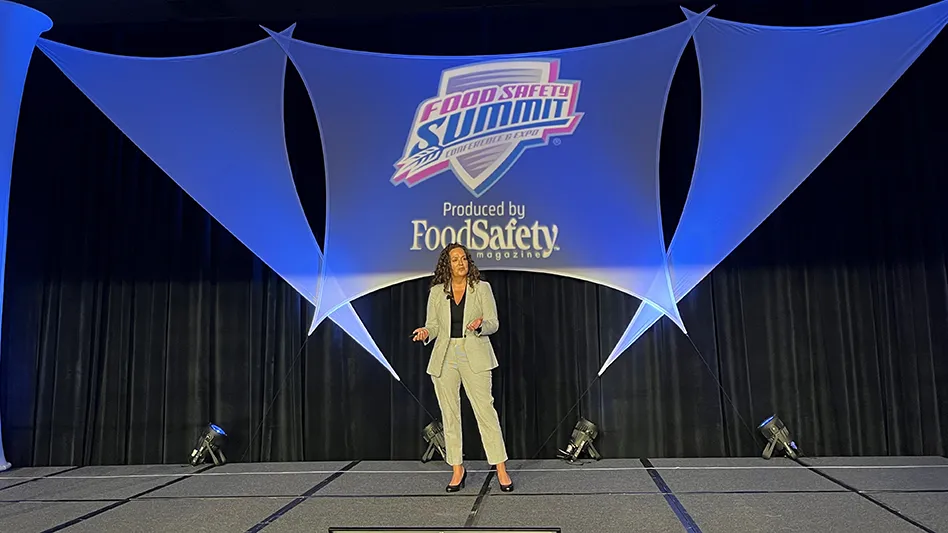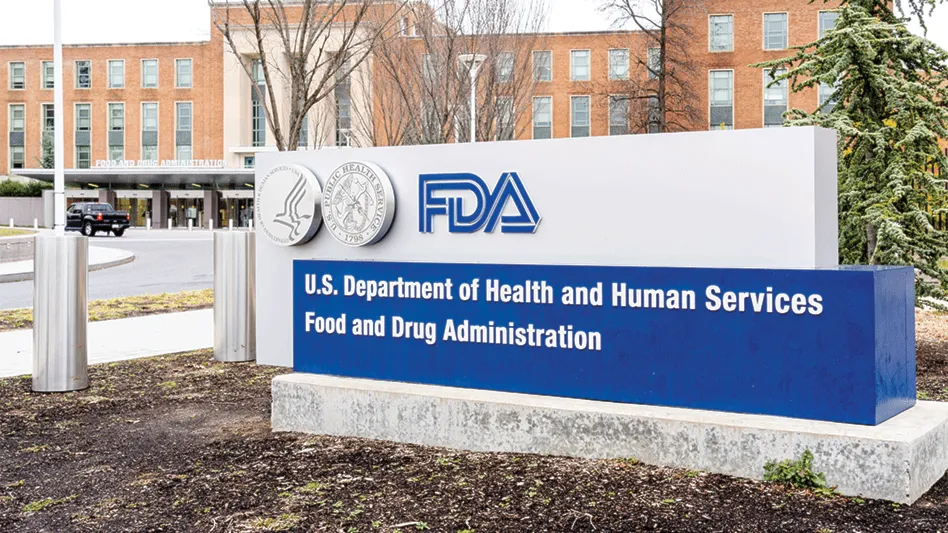
Courtesy Darin Detwiler
A new documentary about the dangers of foodborne illness in the United States is set to release on Netflix on Aug. 2.
“Poisoned: The Dirty Truth About Your Food,” directed by Stephanie Soechtig, premiered at the Tribeca Film Festival in New York City in June. The film is based on the 2011 book “Poisoned: The True Story of the Deadly E. Coli Outbreak That Changed the Way Americans Eat” by Jeff Benedict.

The documentary opens with the deadly Jack in the Box E. coli outbreak of 1993 and shares the stories of families whose loved ones have been victims of foodborne illness, including QA contributing editor Darin Detwiler, whose 16-month-old son Riley died from an E. coli infection originating from Jack in the Box beef patties. According to the Netflix synopsis, the film is “a shocking indictment of the food industry and its regulators” and “exposes how decades of apathy and malfeasance have left the American food supply and its consumers vulnerable to deadly pathogens like E. coli and Salmonella.”
Detwiler, an associate professor of food policy at Northeastern University, talked with QA about what it was like being a part of the film, what he hopes viewers and the industry take away from it and why he feels so strongly about sharing his family’s story and the stories of others affected by foodborne illness.
Quality Assurance & Food Safety: How did you become involved in the documentary?
Darin Detwiler: Bill Marler had recommended to the director and the producer that they connect with me because I had just written my first book, "Food Safety: Past, Present and Predictions," and because not only was I a participant in 1993, but I'm one of the only people that was a participant and has gone on to do what I do, and who is not Bill Marler or Mike Taylor or Ann Marie McNamara. The four of us have been on stage together so many times. But I'm not the lawyer. I'm not the corporate person. I'm not the regulator. I'm the academic who has the personal story.
So the production team reached out to me, and they wanted me to be on board both as a technical consultant and to use my book and to help them edit some of the stories, wrap their heads around it, provide different insights, like who are some people to interview around these different elements of the story and that kind of thing.
And then, obviously, there was the me in front of the camera being interviewed. We spent a whole day. They rented a house and turned it into a studio. They interviewed me all day long; it was a very long day. They were interviewing me with questions around 1993 and questions around my experiences then, questions around my experiences and my work since then, and then about other specific outbreaks and about food safety in general.
QA: What was your experience like being part of the film?
DD: I've done a lot of media in three decades. But if there was going to be this documentary, and let's say it was going to be the “An Inconvenient Truth” or the “Bowling for Columbine” or whatever of food safety documentaries — I didn't want them doing it and missing the point.
There are two victims profiled. There's me and my son, and then there's a young girl who is a senior in high school, and she got sick from lettuce. She ultimately survived, though there's questions around her future medical and health needs. Granted, I'm so glad that she survived. But imagine if that was the only story they included. If they didn't include it such that you get the idea of the true burden of disease. It wasn't so much that my son's story had to be told as much as it was that there's got to be the telling of a story that is "This is the gut punch." This is the "I didn't realize it could be that bad." This is the "That could be my child." You rip off the Band-Aid, you rip off the scab, and you dig deep into the soul in terms of this is what 3,000 families every year go through.

There's also the experience of letting Hollywood do its thing. It just kind of goes away for a while. And then all of a sudden, you see the final product. They sent me a link. I watched it first by myself, and I couldn't believe what I was seeing. I can be interviewed for an hour by a journalist, and I have one sentence in an article. But to be on screen as much as I was on screen, I did not predict that. And to have my son's story be told in such a complete and detailed and chronicled scale was just — it hit me.
QA: What was it like attending the premiere at the Tribeca Film Festival?
DD: One minute you're like, OK, this is real. The next minute, you're on the red carpet getting your photo taken, and you've got a Getty image online. You're meeting up with a lot of the other people that were involved in the documentary, and you're taking photos and selfies with them. And then all of a sudden, you're in this movie theater. To watch this in front of a live audience on a big screen and to hear the crying and just the emotion in that room — someone asked me, were people coming up to me and shaking my hand afterwards? I was like, “No, they were coming up to me and hugging me and crying.”

I will never forget having had the opportunity to have that validation that I was involved in this movie. It sounds crazy, but seeing it in your living room on your TV, it's almost like, did this really happen? To be there in that live audience in the auditorium to watch it play out in front of others, that is this tangible element.
Here we were in New York, and not too far away is the 9/11 memorial. And there's some 3,000 souls that perished that day on 9/11. There's this massive monument, and there's other monuments across the country. Some 3,000 people die from foodborne illnesses every single year in America. And there's no monument, no memorial, no statue for them. There's a point where it's like watching it on TV versus watching it in front of a live audience. You know, did this really happen? Because it's almost as if there's no validation. There's no acknowledgment. And yes, I'm in the news all the time with the work that I do as a result of this, but there are so many families that the only kind of memorial they have is that empty seat at their family table and a death certificate and bills or legal documents. To me, personally, this documentary serves as the closest thing to that memorial or monument or statue in terms of something that is tangible, something that is there for the world to see when it comes to my son's death.
I got extremely emotional during the viewing of the documentary. Something that I've secretly wanted for a long time is to make the legacy of my son be bigger than even what I've put into it over the last three decades, and I saw that in this work. It's weird, because it's like a Pyrrhic victory. It's not like I'm going to get him back now.
QA: I've seen the film being referred to as a call to action. How do you think a film like this can spur action or change, and what changes would you like to see come from this?
DD: When we talk about food safety, it's associated with this invisible threat, if you will. I grew up with the Three Mile Island incident and the Space Shuttle Challenger explosion, and I was a nuclear engineer on a submarine. There's a lot of invisible threats out there in this world, and foodborne pathogens are one of those threats. As parents, we say things to our children like, “Look both ways before you cross the street. Hold my hand. Put on your seatbelt when we get in the car.” So we are aware of potential and even invisible dangers. We don't talk about this with food.
Perhaps one of my biggest goals in terms of consumer audiences is that maybe people start asking questions and talking about how they can't just assume food is safe anymore. How there are things that need to be done, questions that need to be asked, trust that needs to be built and considerations that need to be made.
There's this whole notion that America has the safest food supply in the world. We can't use that as an excuse anymore. It's got to be something that we live up to. It's got to be something that's a charge. It's a mission. We have to work harder in order for it to be this way.
There's a scene in the movie where there's a bunch of baby chicks that go down a conveyor belt, and they just kind of drop off the end. I see a message in that industry can no longer treat consumers like those chicks that just fall off the edge of the conveyor belt. We accept that it's business as usual when people are harmed, when people are hospitalized, when people live with a life forever changed, or when parents live with a chair forever empty at the family table. That's no longer going to be accepted, nor should it ever have been by consumers as OK.
I think that the industry might look at this and go, “Now consumers are going to know much more and ask more questions and demand more from us.” But I hope that the industry also looks at in terms of perhaps when they pull from the pool of consumers to be people who work on the production floor, work in whatever capacity from farm to fork, that perhaps their new employees come with a bit more insight and understanding in terms of “Why do I have to do this?” “Why am I expected to wash my hands?” Or whatever it is. It's not just a hoop; it's a better understanding of, “Oh, because I don't want that to happen.”
There will always be failures. And most of those failures are not equipment failures. They're not natural disasters. They are people making mistakes because they don't know. There's only two reasons: you either don't know or you don't care. And I hope that this solves some of those two issues for many people in the food industry, that they do know and they do care.
Latest from Quality Assurance & Food Safety
- FDA Issues Update on Post-Market Assessment of Tara Flour
- ASI Announces Training Partnership with Rootwurks
- Nfinite Nanotech Closes $6.5 Million Seed Financing to Create Flexible Food Packaging with Nanotechnology
- University of Pretoria Food Science Student Wins IFT and PepsiCo’s Academic and Travel Undergraduate Hybrid Scholarship
- Kraft Natural Cheese and Shawn Johnson East Celebrate Launch of Kraft Signature Shreds
- Natural Sourcing International Announces Voluntary Recall of Black Chia Seeds
- PTNPA's DC Fly-In Connects Members with Policymakers
- Breck Partners Acquires NPX One





